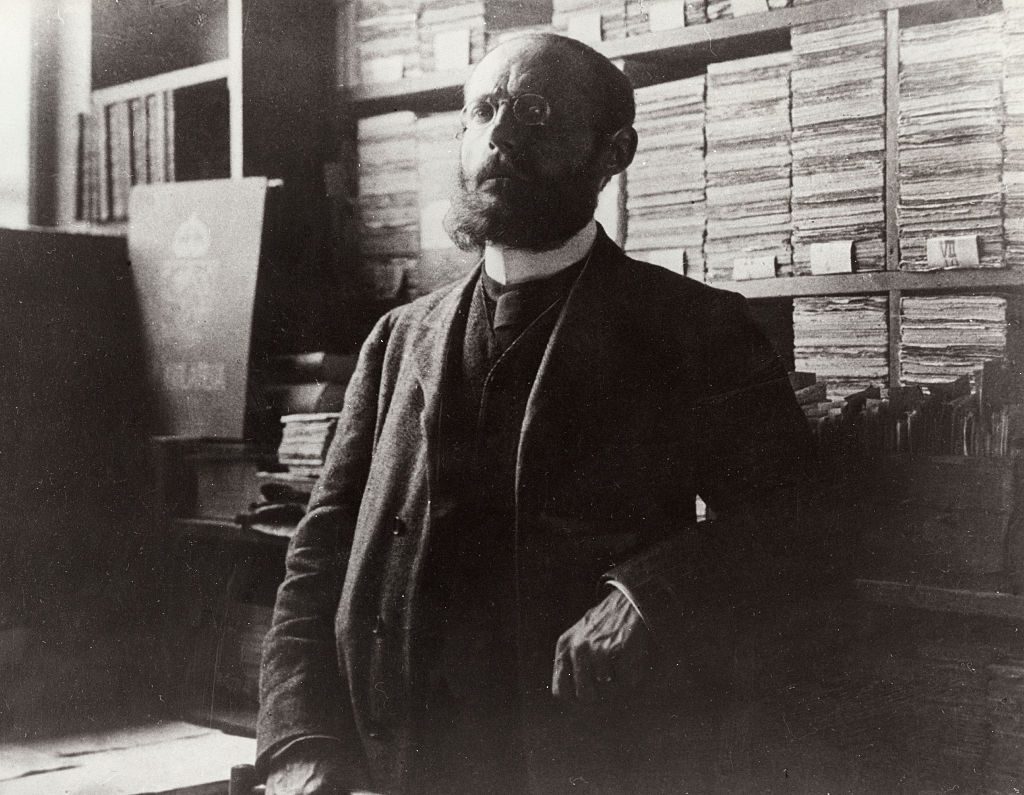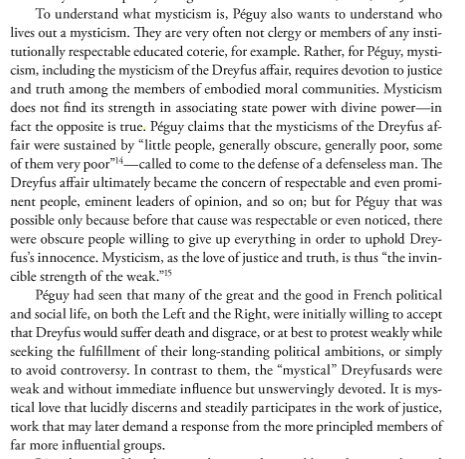Charles Péguy And Mystical Politics

Much as he liked Benda, Péguy found his extreme rationalism arid and unsustaining, particularly when it came to fostering solidarity among the citizens of a nation. Péguy’s conviction that all politics begins in mystique—that is, in the very mysteriousness of shared transcendent beliefs and myths—made him a shrewd and prophetic critic of the conditions of social separation and anomie that have repeatedly provoked ultranationalist populism in modern democracies, usually to disastrous effect.
One might similarly fault [biographer Matthew] Maguire’s rather scant handling of Péguy’s differences with the reactionary Catholics. While his dealings with Charles Maurras could be cordial—Maurras even reviewed some of his work favorably—Péguy was deeply bothered by the way Maurras and others of the Catholic right instrumentalized religion to advance their antiliberal program. The craven clericalism of the right also repelled Péguy, finally driving him to abandon churchgoing altogether, though he remained supportive of Catholic charitable work and, in his heart, deeply committed to the beliefs of his faith.
More:
Péguy believed that advocates of metaphysical hegemony on both the left and the right were foes of the liberal arts that were indispensable to republican democracy. Joined invisibly in their shared immanentism, these hegemonists embodied the deep intolerance of late modernity—and therefore were to be exposed and resisted for what they so dangerously espoused. Call it one of the great tragedies of modernity that the warnings of this clear and prophetic voice were lost not just to his time but to the century that has since unfolded.
Read it all. I’m tempted to get Maguire’s book, given my interest in Péguy (who re-started the annual walking pilgrimage from Paris to Chartres), and because I’m curious about his critique of the “immanentism” of the Left and the Right of his day.
The conditions of social separation and anomie that led to ultranationalist populism exist today, of course, and, I think, account for the increasing radicalization, on both the Left and Right, of our politics. What I would like to know, and that this new biography can answer, is why Péguy thought late modernity worth defending, given that it is responsible for the disenchantment of the world, and the exorcism of mystique from the body politic.
Could it be that he believed that as deficient as late modernity is, the likely alternatives — dictatorship of the Left or the Right — would be much worse? Péguy was not a liberal, but rather a democratic socialist. I poked around a little on the “Look Inside” feature of Amazon.com, and found a bit of information about Péguy and mystique. Maguire says that the most famous sentence Péguy ever wrote is, “Everything begins in mysticism and ends in politics.” According to Maguire, this simply means that any just political order must be founded on shared convictions about ultimate reality. From the book:

The idea of mysticism (or, less poetically, metaphysics) as the basis for politics is not new:
 More:
More:


That critique sounds a lot like today, does it not? Wokeness is an attempt to re-enchant politics from the Left. We don’t have an articulated Nationalism to do the same from the Right, though we may yet; Trumpism was the start of something, but it died in the desert of his ego.
Even so, I don’t really understand what Péguy is getting at here. If it’s a mysticism ultimately grounded in sacrificial love, how do you discern the good kind of mysticism from the bad kind? After all, to the Nazis, Horst Wessel was a martyr. The totalitarian Left has its martyrs too, those who gave it all up for the Sacred Cause. I suppose I’ll need to buy the book if I want to know — or maybe we have Péguy readers in this blog’s audience, and they can enlighten me.
There must be in this something of Eliot’s famous line about if you will not have God, you should be prepared to pay your respects to Stalin. That is, the idea that no society can live for long with a politics that is merely procedural. But how can we establish a politics on shared transcendent belief when most people no longer believe in anything but themselves? You cannot coerce people into believing something that they don’t; that way lies tyranny.
An aside that I believe is related. The other day, a Czech Catholic reader of Live Not By Lies (I sent him an advance copy for review) wrote to me to say:
The people described in the book — the ones you suggest the readers should emulate — were a tiny fraction of a minority. Almost nobody is like that. They prevailed alone, as single families, or, sometimes, in the smallest possible groups. When the time came these people were joined by many others who were not like them but did not want to live in lies.
But why? What was the truth they were after? It was not Christianity or faith per se. In my opinion, it was the roots.
The roots were Christian, obviously, but that did not play a direct role. It was the long historical narrative the Czechs, or Slovaks, etc. wanted to be, and stay a part of. Communism was always viewed as something totally alien and imported. Is American culture/history strong enough — or even definable enough — so it can eventually rejoin the few fools who will dissent and survive the upcoming totalitarians?
I think that American totalitarianism is qualitatively a new experiment because it is being applied to a culturally splintered and historically young environment. From this perspective, the current attempts to rewrite and reframe American history make all the sense. When the US plunges into its totalitarian future, nobody will emerge, and the dissent, like John Savage, will eventually fizzle out.
That was extremely sobering. This man, a Catholic, believes that it wasn’t Christian faith that helped his people resist Communism (those who did resist, that is), but rather the mystique of sharing a long tribal history — a history that was entwined with Christianity, but that was broader than Christianity.
We don’t have that here, do we?
Subscribe for as little as $5/mo to start commenting on Rod’s blog.